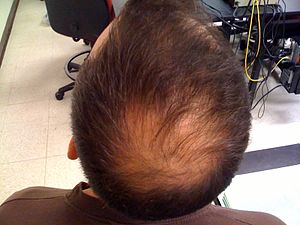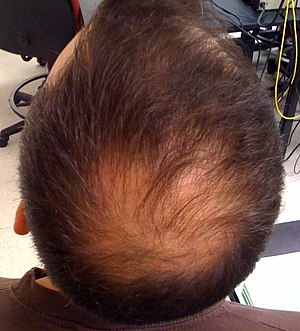Hair loss products are big business — 3.5 billion dollar’s worth in the United States alone. Unfortunately, many of these products are ineffective treatments or outright scams. For this reason, the American Hair Loss Association (AHLA) recommends avoiding products that are not approved by the Food and Drug Administration (FDA).
This does not mean that FDA-approved treatments are the only effective ones. Many men have found success with topical scalp treatments, hair loss shampoos, nutritional supplements and herbal remedies. Understanding what causes hair loss is the best way to find effective treatments.
Genetic or Pattern Hair Loss
Genetic hair loss is the most common type of hair loss. It affects more than 95 percent of bald men, and it can strike men as young as 21 years of age. Contrary to common belief, genetic hair loss is not age-related but hormone-related.
This common type of hair loss has a medical name: androgenetic alopecia. However, most people know it as male pattern baldness. Men with this type of baldness are genetically prone to a hormone sensitivity that damages the hair follicles. The condition involves DHT, a short abbreviation for dihydrotestosterone.
A metabolic enzyme called Type II 5-alpha-reductase converts the male hormone testosterone into a potent byproduct called DHT. While this important androgen is necessary for the development of secondary male sex characteristics, it can also damage the scalp.
When DHT binds to scalp hair follicles, it causes them to shrink. This makes it almost impossible for hair to grow in certain areas of the scalp. As hair falls out naturally, new hair grows in thinner and shorter. Eventually, it stops growing at all.
Effective Hair Loss Treatments
Despite all of the hair loss products on the market, only those that inhibit 5-alpha-reductase or block DHT can effectively stop hair loss. Two FDA-approved drugs, finasteride and minoxidil, are formulated to do just that. Products that contain these drugs are the most effective treatments for hair loss.
Finasteride is an oral medication that blocks harmful DHT to effectively halt current hair loss. It also prevents further hair loss and may regrow hair in some men. Finasteride is available only by prescription.
Minoxidil is a non-prescription topical scalp treatment. It is found in many over-the-counter hair loss products and shampoos. Minoxidil is effective for new hair growth.
Potential Side Effects
While both of these products are good treatments for male pattern baldness, they also have the potential for side effects. Finasteride has been linked to sexual problems such as erectile dysfunction (ED), premature ejaculation and a low sex drive. Minoxidil may cause scalp irritation and infection.
Nevertheless, the AHLA recommends these products because they are clinically proven to treat male pattern baldness. When they are used according to prescription or doctor recommendation, they are less likely to cause negative side effects.
Many men combine hair loss treatments for optimum results. For example, they may use prescription drugs, topical scalp treatments or shampoos and nutritional supplements. The best scalp creams and shampoos contain ingredients that inhibit DHT and the enzyme that creates it. The best herbs, vitamins and other nutrients are those that support healthy hair.
[toggle title=”Featured images”]
[/toggle]


There are many products in the market which are advertised as hair loss/hair growth products. But most of the people using finasteride, minoxidil and some are going for medications like hair transplant treatments, etc., and some are going for other natural ways. Minoxidil is giving better results in treating hair loss compared to finasteride. Finasteride is giving good results but there were side effects for this products which are lasting for years. Minoxidil also contains side effects like scalp itching, stomach pain, swelling, etc but the combination of minoxidilProvillus with biotin, saw palmetto causes less side effects.